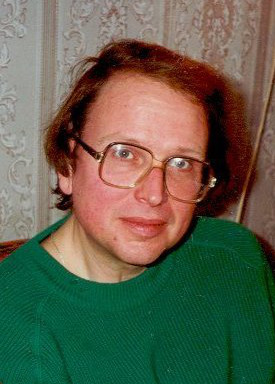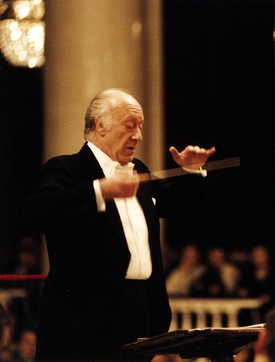Related Research Articles
Dmitri Shostakovich's String Quartet No. 8 in C minor, Op. 110, was written in three days.
The Cello Concerto No. 1 in E-flat major, Op. 107, was composed in 1959 by Dmitri Shostakovich. Shostakovich wrote the work for his friend Mstislav Rostropovich, who committed it to memory in four days. He premiered it on October 4, 1959, at the Large Hall of the Leningrad Conservatory with the Leningrad Philharmonic Orchestra conducted by Yevgeny Mravinsky. The first recording was made in two days following the premiere by Rostropovich and the Moscow Philharmonic Orchestra conducted by Aleksandr Gauk.
The Cello Concerto No. 2, Opus 126, was written by Dmitri Shostakovich in the spring of 1966 in the Crimea. Like the first concerto, it was written for Mstislav Rostropovich, who gave the premiere in Moscow under Yevgeny Svetlanov on 25 September 1966 at the composer's 60th birthday concert. Sometimes the concerto is listed as being in the key of G, but the score gives no such indication.

Mieczysław Weinberg was a Polish-born Soviet composer and pianist.

Yuri Abramovich Bashmet is a Russian conductor, violinist, and violist.
The Kopelman Quartet is a Russian string quartet founded in 2002 by Mikhail Kopelman (violin), Boris Kuschnir (violin), Igor Sulyga (viola) and Mikhail Milman (cello). They studied at the Moscow Conservatory in the 1970s, but pursued individual careers for twenty-five years before founding the quartet.

Dmitri Shostakovich's String Quartet No. 10 in A-flat major, Op. 118, was composed from 9 to 20 July 1964. It was premiered by the Beethoven Quartet in Moscow and is dedicated to composer Mieczysław (Moisei) Weinberg, a close friend of Shostakovich. It has been described as cultivating the uncertain mood of his earlier Stalin-era quartets, as well as foreshadowing the austerity and emotional distance of his later works. The quartet typified the preference for chamber music over large scale works, such as symphonies, that characterised his late period. According to musicologist Richard Taruskin, this made him the first Russian composer to devote so much time to the string quartet medium.

Viktor Viktorovich Tretiakov is a Russian violinist and conductor. Other spellings of his name are Victor, Tretyakov and Tretjakov.
Valentin Berlinsky was a Russian cellist. He was a member of the world-famous Borodin Quartet in 1945 and was a member until 2007. He was the only Quartet member to have played in it from the beginning. Berlinsky played for the Borodin Quartet for 60 years, making him the longest-serving member of what The New York Times described as being "by all accounts the longest continuously playing" string quartet in the world.

Alexander Ivashkin, was a Russian cellist, writer, academic and conductor.
Sviatoslav Nikolayevich Knushevitsky was a Soviet-Russian classical cellist. He was particularly noted for his partnership with the violinist David Oistrakh and the pianist Lev Oborin in a renowned piano trio from 1940 until his death. After Mstislav Rostropovich and Daniil Shafran, he is spoken of as one of the pre-eminent Russian cellists of the 20th century.

Rudolf Borisovich Barshai was a Soviet and Russian conductor and violist.

The Moscow Chamber Orchestra (MCO) is a chamber orchestra run under the auspices of the Moscow Philharmonia, a state-run enterprise, formerly under the patronage of the Ministry of Culture and now, Ministry of Culture of Russian Federation.
The Borodin Trio was a classical music trio founded in 1976 by Russians Rostislav Dubinsky (1923–97), his wife, pianist Luba Edlina, and cellist Yuli Turovsky (1939–2013), after Dubinsky, founding first violinist of the famed Borodin Quartet, emigrated from the U.S.S.R. to the Netherlands and later to the United States.

Ludmila Valentinovna Berlinskaya is a Russian pianist and actress born in 1960 in Moscow. She is the daughter of cellist Valentin Berlinsky, founder of the Borodin Quartet.

Pavel Karmanov is a composer and a Russian rock musician.

The Brahms Trio is one of the leading chamber ensembles of Russia, piano trio that unites violinist Nikolai Sachenko – winner of the Golden Medal of the XI International Tchaikovsky Competition in Moscow, cellist Kirill Rodin – winner of the Golden Medal of the VIII International Tchaikovsky Competition in Moscow, and pianist Natalia Rubinstein – First Prize winner of the Joseph Joachim Chamber Music Competition in Weimar and founder of the ensemble.

Yuri Alexandrovich Falik was a Russian composer, orchestral conductor, cellist, a board member of the Leningrad (Saint-Petersburg) branch of the Composers' Union, and People's Artist of Russia.
The Shostakovich Quartet was a string quartet formed in September 1966 at the Moscow Conservatory, and which continued to perform for some 47 years until the start of 2014.
References
- 1 2 3 4 Fox, Margalit. "Valentin Berlinsky, Mainstay Cellist of the Borodin Quartet, Dies at 83 ", The New York Times , December 25, 2008. Accessed January 14, 2009.
- ↑ As stated on the BBC Radio 3 "Lunchtime Concert" of 15 April 2010 devoted to a concert by the Borodin Quartet.
- 1 2 3 4 5 6 Obituary of Valentin Berlinsky, The Daily Telegraph , December 23, 2008, Accessed December 23, 2008
- ↑ Anna Bulycheva (2015). "The State Borodin Quartet". review. Mariinski Theatre . Retrieved 19 July 2017.[ permanent dead link ]
- ↑ Dubinsky, Rostislav (1989). Stormy Applause. Making Music in a Workers State. Boston, MA: Northeastern University Press. ISBN 9780091742577.